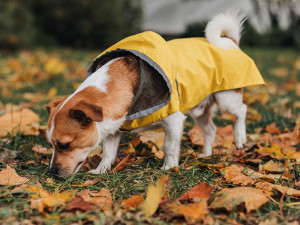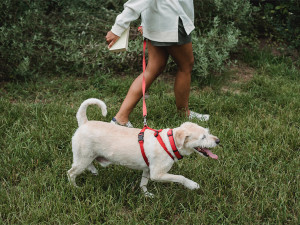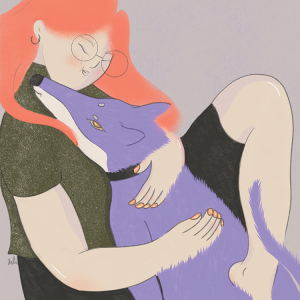Dogs Have Favorite Scents, Study Says—And No, It’s Not Just the Smell of Food
So, go ahead and get that lavender-scented candle.

share article

Your pet wants you to read our newsletter. (Then give them a treat.)
A dog’s sense of smell is so powerful, it’s kind of hard to wrap our heads around it as humans. There’s evidence that pups can smell stressopens in a new tab, fearopens in a new tab, certain types of canceropens in a new tab, and COVID-19opens in a new tab — and working dogs have been trained to smell drugs, explosives, and lost or trappedopens in a new tab people.
“A dog’s sense of smell is estimated to be 10,000 to 100,000 times more sensitive and accurate than a human’s,” says veterinarian Dr. Lindsay Butzeropens in a new tab. “Dogs have up to 300 million olfactory receptors in their noses, compared to about six million in humans.”
So, if there are certain scents that you can’t get enough of (like that heavenly section of the mall that has a Bath & Body Works), the same is likely true for your dog — times 50. A 2022 study published in opens in a new tab found that most dogs favor a few specific scents. And turns out they might even be some of the same as yours.
Dogs’ favorite smells
To find out which scents dogs favor, researchers presented 32 odor samples to 14 different dogs. Cameras recorded the dogs and tracked their interest in the different scents throughout multiple trials. When dogs sniffed for longer than two seconds, this was considered a positive interaction.
They found that dogs loved lavender, blueberry, blackberry, peppermint, and rose. Lavender, in particular, has researched benefits for pups and humans alike. “Lavender has been proven to affect a variety of species (including dogs and humans), with the scent of lavender shown to lower the heart rate of dogs … as well as increasing the rest and sitting time while riding in a car,” wrote the study’s lead author, Agata Kokocińska.
And we didn’t need a study to tell us this, but the results also showed that dogs really, really love the smell of food. Obviously. “The odor of food was always preferred by the dogs over the other smells presented in the same trial,” Kokocińska wrote.
Using smells for enrichment
“The sense of smell in dogs is not only a highly developed sense, but also plays a huge role in the animal’s welfare,” Kokocińska wrote. In humans and dogs, scents can evoke past memories and impact mood.
Knowing how important scents are to pups, some shelters have begun using scent enrichment to calm dogs. Morag Greaney, the former adoption and foster supervisor at McKamey Animal Center in Chattanooga, Tennessee, used to spray essential oils mixed with water onto the shelter grounds daily.
He believed the scents calmed the dogs and the variety of new smells improved their environment. “I would absolutely recommend that dog owners use scents with their animals,” Greaney saidopens in a new tab.
Use caution
Just keep in mind that many essential oils are dangerous for petsopens in a new tab — including cinnamon, peppermint, and pine. The more concentrated the oil, the more dangerous it is, so keep your pet a safe distance from essential oils, and be sure the scent is not on the no-no listopens in a new tab (good news: Lavender oilopens in a new tab is generally safe for dogs).
The ASPCAopens in a new tab Animal Poison Control Center (APCC) advises, “Using an oil diffuser for a short time period in a secured area — one that your dog or cat cannot access — is not likely to be an issue.”

Sio Hornbuckle
Sio Hornbuckle is a writer living in New York City with their cat, Toni Collette.
Related articles
![Young Woman Working From Home with Her Dog]() opens in a new tab
opens in a new tabThe 10 Best Non-Toxic House Plants for Dogs
Brb, running out to buy air plants and succulents.
![Calico cat sniffing wooden bamboo essential oil diffuser]() opens in a new tab
opens in a new tabWhy Essential Oils and Pets Don’t Mix
How to keep your DIY spa pet-friendly.
![Dark brown dog sitting on a gray couch in a living room]() opens in a new tab
opens in a new tabTurns Out Dogs Can Tell, Er, Smell Time
There’s no time like the present, according to your pet.
![Jack Russell Terrier in a yellow raincoat walks through the autumn park.]() opens in a new tab
opens in a new tabDog Sense of Smell: What Can Dogs Smell?
There’s a reason that sweet little nose is always pressed to the ground.
![A woman with a book in her hand walking her dog on a leash in a grassy park.]() opens in a new tab
opens in a new tab“Scent Walks”: Come On, All the Dogs Are Doing It
Why you should let your dog get all their sniffs out on a stroll.
![Illustration of a woman hugging a dog]() opens in a new tab
opens in a new tabIs That... Stress Your Dog Smells? This Study Says So
Research finds that your pup can tell—er, smell—when you’ve been doom-scrolling.






